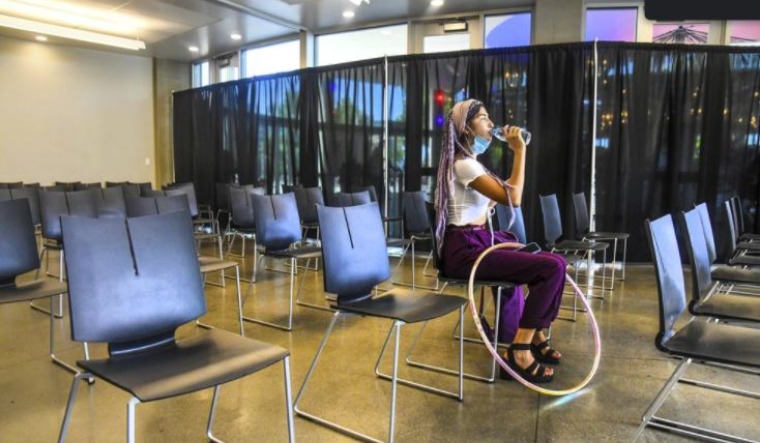About a dozen deaths in Washington and Oregon may be tied to an intense heatwave that brought scorching temperatures to the Northwest and caused one power utility to impose rolling blackouts amid heavy demand.
The dangerous weather that gave Seattle and Portland consecutive days of record high temperatures exceeding 100 degrees Fahrenheit (37 deg. C) eased in those cities on Tuesday. But inland Spokane, towns in eastern Oregon and cities in Idaho saw temperatures spike.
The National Weather Service said the mercury reached 109 F (42 deg. C) on Tuesday in Spokane — the highest temperature ever recorded there.
About 9,300 Avista Utilities customers in Spokane lost power on Monday and the company said more planned blackouts began on Tuesday afternoon in the city of about 220,000 people.
Currently, Canada’s west coast and much of America’s Pacific north-west are facing a heatwave.
So why the heatwave?
According to the US National Weather Service, the heat comes from a high-pressure system over the West, buckles in the wind of jets that move across the United States, and vast amounts of land sucked dry by a historic drought, in the 1930s.
Scientists say that the "megadrought", which was first reported in 2000, could be blamed on man-made climate change and emission of greenhouse gases. At least 14 new fires broke out in Montana and Wyoming between June 13-20, contributing to the heatwave. Fires were reported in Arizona and New Mexico around the same time.
Kristie L. Ebi, a professor at the Centre for Health and Global Environment at the University of Washington told AP that the western United States and the rest of the world can expect more extreme heatwaves in the future if officials do not try to reduce greenhouse gas emissions.
The heatwave is so intense, that at some places, it is melting power cables, causing power outages. Also, planned blackouts are being rolled out as the power demand has gone up. Extreme heat can affect power transformers, which can affect water sanitation, public transport and fuel pumps. The climate in North-Western America is usually mild and therefore, people usually do not have air conditioning at home.
Some local governments have, therefore, set up “cooling centres” in locations like stadiums, providing a space where people can work, get water and sleep. Outdoor activities have been halted and schools been closed. Urban areas are more adversely affected, as people and infrastructure in urban areas tend to absorb more heat than rural areas. Extreme heat in Everson, Washington has caused the pavement to soften and expand. This could eventually lead to rutting, buckling, and potholes, particularly in high-traffic areas.
The Democratic senator Maria Cantwell told The Guardian the heat illustrated an urgent need for the federal infrastructure package to promote clean energy, cut greenhouse gas emissions and protect people from extreme heat.
In the city of Burnaby, just east of Vancouver people are flooding department stores to purchase fans and cooling systems.
“This heatwave poses a significant threat to British Columbians, particularly seniors, children and the most vulnerable members of society. Climate change is a public health emergency and we need to treat it like one,” Sonia Furstenau, the leader of the Green party of British Columbia, tweeted on Monday.
According to the US Drought Monitor, 58.4 million people live in drought-affected areas.
“We try to limit outages to one hour per customer,” said Heather Rosentrater, an Avista vice president for energy delivery.
The King County Medical Examiner’s office said two people died due to hyperthermia, meaning their bodies had become dangerously overheated. The Seattle Times reported they were a 65-year-old Seattle woman and a 68-year-old Enumclaw, Washington, woman.
And the Snohomish County Medical Examiner's Office on Tuesday told the Daily Herald in Everett, Washington, that three men — ages 51, 75 and 77 — died after experiencing heatstroke in their homes. They were from Everett, Granite Falls and Marysville in Washington.
The heat may have claimed the life of a worker on a nursery in Oregon, the state's worker safety agency, known as Oregon OSHA, said on Tuesday.
The man who died was from Guatemala and had arrived in the United States only a few months ago, said Andres Pablo Lucas, owner of Brother Farm Labour Contractor that provided workers for the nursery, including the man who died.
The man, whose name was not disclosed, died at Ernst Nursery and Farms, a wholesale supplier in St. Paul, 20 miles north of Salem, on Saturday amid sweltering temperatures. “The people want to work, to fight to succeed,” he said. “For that reason, they stay”.
Officials in Bremerton, Washington, said heat may have contributed to four deaths in that Puget Sound city. But Vince Hlavaty, Bremerton's medical officer, told the Kitsap Sun that firefighters cannot say definitively whether the heat was the cause of death.
In Bend, Oregon, authorities said the deaths of two homeless people in extreme heat may have been weather-related.
The United Farm Workers urged Washington Governor Jay Inslee to immediately issue emergency heat standards protecting all farms and other outdoor workers in the state with a strong agricultural sector.
Several cities in Idaho also topped 100 F (37 deg. C) on Tuesday with the hottest spot in Lewiston where the temperature reached 115 F (46 deg. C).
President Joe Biden, during an infrastructure speech in Wisconsin, took note of the Northwest as he spoke about the need to be prepared for extreme weather.
--With PTI inputs




